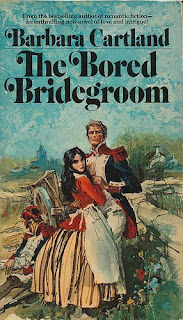
From Barbara Cartland‘s The Prince And the Pekingese:
You have come!” the Prince exclaimed.
“Yes,” said Angelina softly. “I have come.” The Prince paused for a moment looking at the beautiful young woman in a way that made her tremble. “You are so lovely and yet … ” There was a throb of pain in his voice that made Angelina long to comfort him. Whatever we feel for each other, “she whispered, “I realize your country must … come … first.” The Prince looked up sharply. “We feel for each other?” he repeated. “Tell me … what you feel for me.” Angelina shyly lowered her eyes, but his tone was rough and insistent. “Tell me,” the Prince said again. And suddenly, as if it came from the very depths of her being, Angelina’s clear young voice miraculously cried out: “I … love you. I love you. I love you!”
Oh. My. God.
I cannot believe I devoured this stuff when I was young. Granted, I was young, but still–
Along those lines, I was thinking lately about how I’m not comfortable writing heroines who are under 20 years old; when I was 18, in age similar to Cartland’s ellipsis-talking ladies, I did many foolish things. For example, when my first real boyfriend broke up with me, I wore gray eyeshadow so it’d look like I had been losing sleep and walked around with a copy of Vladimir Nabokov‘s Despair so he’d know how I was suffering.
And, of course, that’s not even mentioning the poor fashion choices I made, or how I cut class to go with my best friend Anthony to watch him play video games (he was good enough to spend a quarter for about an hour’s worth of play).
So now that I’m older, and theoretically wiser, I want to read heroines who I believe would make good choices. I don’t want to read about high school age girls who are way wise beyond their years, or who behave like real high schoolers do. Either one is unappealing. I like the current trend towards more mature heroines, although that means us authors have to devise new ways of still making them available (poor family, governess, widow) and somewhat inexperienced (spinster, widow whose husband had some potency issues). It makes it harder and sometimes anachronistic, to write and read heroines who fit the high, yet realistic, standards us romance readers demand.
Have you noticed the trend towards older heroines? What type of heroine did you cut your first romance teeth on? Do you still read those books? And what’s one of the foolishest thing you did in high school?














